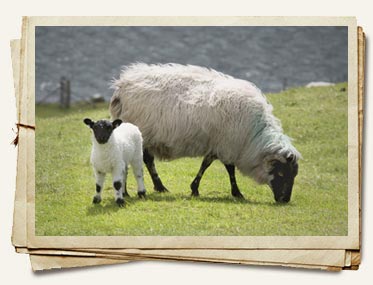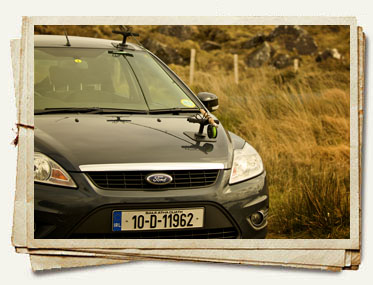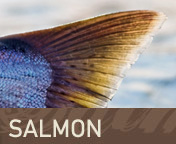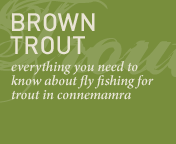

Plan Your Trip

Getting to Ireland is Easy. Leaving Less So.
Planning an overseas fly-fishing trip can be either a dreaded experience or part of the fun, depending entirely on your tolerance for ambiguity and detail.  For travellers who don't like doing a lot of advance planning, we recommend booking a full week at any of the wonderful fishing lodges we recommend in our "Where To Fish" section. They'll supply all the tackle you need, arrange for your guide and feed you three meals a day. All you have to do is buy your air ticket, rent a car (or take the train), pack your bag – and go.
For travellers who don't like doing a lot of advance planning, we recommend booking a full week at any of the wonderful fishing lodges we recommend in our "Where To Fish" section. They'll supply all the tackle you need, arrange for your guide and feed you three meals a day. All you have to do is buy your air ticket, rent a car (or take the train), pack your bag – and go.
But for DIY anglers looking to explore Connemara fly fishing to its fullest, doing a little homework can save you money and provide for a much more complete Irish experience. This section will share all we've learned (the hard way in some cases) about planning a fly-fishing trip to Connemara – on a modest budget.
Flights to ireland.
In this case "remote" does not mean hard to get to.
Flying to Ireland from North America is pleasant because most flights depart in the late afternoon or evening and arrive the next morning, so you can catch four or more hours of sleep after dinner and wake up reasonably refreshed and ready to start your fishing vacation. Most return flights depart in the late morning, which provides ample time to return your rental car, check in, clear security, pre-clear customs and browse the duty-free shops. You will typically arrive home in the afternoon the same day. Time in the air is generally 6-1/2 hours to and from New York and 7-1/2 hours to and from Chicago.
Flights are plentiful during the busy summer tourist season, and less so during the fall and spring, which is when some of the best fishing occurs. So, as always, book your flight early for the best rates, which will run between $650 and $900, depending on how lucky you get.
Aer Lingus, United, American, US Air and Delta offer connecting flights to Dublin (DUB) and/or Shannon (SNN) airports from most American cities, with non-stop flights from New York, Newark, Boston, Chicago, and Philadelphia. Aer Lingus also partners with both United and JetBlue in the U.S. for seamless connections enroute. Canadians will find convenient service to Ireland on both Aer Lingus and Air Canada. If you fly with Aer Lingus, be sure to check the rates for Hertz rental cars booked through the link on the confirmation email they'll send you after buying your air tickets – they're often a bargain.
While most carriers strictly enforce luggage weight limits (1 bag, 50 lbs. maximum), and many have started weighing carry-on bags (22 lbs. maximum) in addition to enforcing size restrictions, we have never been prevented from carrying a fly rod case onboard as our "personal item", providing it's compact enough to fit in an overhead bin.
The Dublin airport is a 3-1/2 to 4 hour drive to Connemara on a modern super-highway. You can fly to Dublin non-stop from Atlanta, Boston, Charlotte, Chicago, New York, and three cities in Florida on Aer Lingus, American, Delta or US Air. If flying into Dublin, consider taking the train to Galway and rent your car there, which can be less expensive and much more relaxing after a long overnight flight (see the "Public Transportation" section for more information).
Shannon Airport is located just north of Limerick on the west coast of Ireland, so it's an easy two-hour drive up to Connemara. We recommend taking a side trip to visit the imposing Cliffs of Moher and drive across The Burren – two of Ireland's most popular natural wonders. We also found that adjusting to driving on the left side of the road is much less nerve-wracking on the lightly travelled roads leading north from Shannon – as opposed to the big city chaos of the roundabouts and toll road around Dublin.
A word of warning on your return trip. Air travellers flying to American destinations pre-clear U.S. customs and immigration at the airports in Dublin and Shannon, not when you arrive back home. That means you must leave a full hour to clear airport security and another hour to pre-clear customs, or you risk missing your flight. Add a bit more time if you want to visit the many gift shops in Dublin's new Terminal 2, which is well worth the extra time.
Airlines:
Aer Lingus:
The easiest and most pleasant flight we have found (traveling from Chicago's O'Hare Airport) is on Aer Lingus; who flies non-stop to Dublin, leaving Chicago in the early evening. And, if you join their airline club "Gold Circle", one of the perks is preferred check-in and boarding. The people that work for Aer Lingus have always been wonderful and very accommodating. Aer Lingus also flies into Shannon, with a return from Dublin with no added premium which is especially nice if you want to end your trip taking in the sights of Dublin – a must stop for anyone who hasn't been there. www.aerlingus.com
American Airlines:
American Airlines also offers non-stop, evening flights to Dublin from Chicago, but fares tend to run higher than Aer Lingus. American does run very occassional fare sales, so it makes good sense to sign up for their "fare sale alerts" to Ireland. www.americanairlines.com
U.S. Airways:
One of the cheaper airlines we've found out of Chicago is U.S. Airways, primarily because flights to Dublin include a stop in Philadelphia. But the layover is typically only 2-3 hours – which isn't too bad considering the fare can run up to $250 less than non-stop fares, so it's always worth a look! www.usairways.com
United Airlines (and partners):
We have not flown United to Ireland, but they frequently partner with Aer Lingus and other airlines to Dublin. Fares tend to run the same as Aer Lingus or American, but often stop in London and connect to other partner flights. United.com
Air Canada:
A great option if flying from Canada. www.aircanada.com
Using Trip Advisor for Your Fare Search:
The absolute best place we have found to search fares is on Trip Advisor. Most people don't think of using Trip Advisor for flight search, but it offers a comprehensive list of airlines, and presents fares including ALL taxes and fees right up front. It is a very quick and easy way to see what fares are running and when. If you check "flexible dates", you can browse fares over monthly calendars – which is really helpful to see advance fare bargains. Check Flights on Trip Advisor
Small Rental Cars.
For big experiences in a land of narrow roads.
Renting a car is the most convenient way to travel around Ireland.  For the first day or two, it will take teamwork to stay on the right (left) side of the road, especially when making turns at crossings, on roundabouts in larger cities, or when pulling out on a highway from a parking lot or side street. If you think you will be uncomfortable shifting a manual transmission with your left hand, seriously consider upgrading to an automatic transmission. We always do because it's just one less thing to get used to!
For the first day or two, it will take teamwork to stay on the right (left) side of the road, especially when making turns at crossings, on roundabouts in larger cities, or when pulling out on a highway from a parking lot or side street. If you think you will be uncomfortable shifting a manual transmission with your left hand, seriously consider upgrading to an automatic transmission. We always do because it's just one less thing to get used to!
Renting a car requires advanced planning because the insurance is very expensive, and your VISA and personal automobile insurance policy will not cover damage to cars rented in Ireland. If you think it will, get confirmation in writing and bring it with you.
Because the deductible for basic collision coverage (CDW – Collision Damage Waiver) usually exceeds $1,000, we recommend buying what's called "super comprehensive collision damage waver" insurance – or "super CDW" – with no deductible and coverage for tires, windshields and side mirrors – all of which are vulnerable on narrow Irish roads.
Super CDW (sometimes called SDW) creates a lot of confusion for first-time car renters in Ireland because it's usually not offered on the website where you reserve your car. Instead, you learn about it from the agent at the rental car desk in the airport, and most normally wary travellers wonder why they're being sold more collision insurance after they've already bought the basic CDW offered online. Buy it. It costs more, but is worth every penny if only for the peace of mind it provides the first time you scrape a roadside hedge while squeezing past an oncoming tour bus at 50 miles per hour!
Finally, if you fly on Aer Lingus, you might consider booking your rental car through the link they provide on the confirmation email they send after paying for your air tickets. We usually save over a hundred dollars by booking our Hertz car right through Aer Lingus right after we purchase our airline tickets.
Most major cities are connected by modern superhighways, and the primary roads run from excellent to pretty good, so only the more remote, rural roads will occasionally set your hair on end. Rural Irish roads are narrow, winding and hemmed in by stone walls and thick hedges – so we recommend renting as small car as you can squeeze into. You'll be especially thankful you did every time you're confronted by an oncoming truck or motor coach – and when it comes time to refill the gas tank with the most expensive fuel you may ever buy.
Speed limits are posted in kilometers, which are about 60% of a mile, so a 100 kpm speed limit is 62 mph. You will find you rarely go the posted speed limit – with the exception of on the motorways – because the roads can be winding and bordered with walls and hedges with little to no shoulder. And don't even think about driving after a big evening at the pub, because drunk driving is not just a really bad idea in Ireland, but it is a criminal offense. If you are planning a night out on the town, we recommend arranging for a taxi through your host or accommodation.
Pedestrians almost always have the right-of-way, so when in doubt, stop and let them cross the road. Talking on a cell phone while driving is prohibited, and always be especially alert when driving on winding rural roads because you might encounter a cyclist, a slow-moving tractor, or herd of sheep around the next bend!
.....................................................................................................................................................................................
Rental Car Companies:
We have had good luck with the following rental car companies:
Hertz Car Rental
Hertz Car Rental (thru Aer Lingus)
Dan Dooley Car Hire
www.dan-dooley.ie
.....................................................................................................................................................................................
VIP Car/Driver Services:
Another very appealing option is to hire a car and driver for travel in Ireland. They'll meet you at the airport, and all you have to do is sit back and enjoy the view. Most of the drivers are also knowledgeable historians and tour guides, and can provide a running commentary (or not) during your travels, as well as recommend special out-of-the-way sites, restaurants and pubs that are not frequented by tourists.
If you are traveling with a group – a mini coach is the way to go. Your group will be collected at the airport and driven to your angling accommodations – and then picked up and returned to the airport at the end of your stay. You can also arrange the driver to stay through your visit "on call" for the ultimate convenience of not messing with driving yourself when touring the area. Or, have the driver collect your group a few days before your flight departure and have them take you on tour to visit some of the best-known sites for the last few days of your visit to Ireland.
We recommend Morton's Coaches for indivdually tailored driving scenarios. You can arrange for personal tranport to and from the airport (often for less than the cost a rental car) – or you can go all out and tailor a driving tour for your angling adventure. Contact Morton Coaches for a personalized itinerary and quote. And, be sure to ask for Stephen Taylor for your driver because, if available, he is the best we know and very knowledgable!
E-mail: info@mortonscoaches.ie for more information.
Local Transporation
Getting Around In Connemara
Ireland is well served with fast, efficient and spotlessly clean trains and buses, and it's very practical to plan a fishing trip to Connemara relying entirely on public transportation. Irish Rail's trains are fast and frequent, and travel to all major cities. Two bus companies, Bus Eireann (the national bus line) and CitiLink, are scheduled less frequently but travel to virtually every village in the country.
The best way to plan a trip using the public option is to select your lodging first, and then consult with each proprietor about how to get there. Some fishing lodges utilize independent minibus services to transport their guests to and from the nearest airport or train station. So, it always pays to ask.
There is frequent service on Irish Rail trains between Dublin's Heuson Rail Station and Galway. Heuston Station is easy to get to from the airport on the economical Airlink Coach, Route 748. Once in Galway, you can connect with a Bus Eierann motor coach to either Clifden, Toombeola or Roundstone, or CitiLink to Clifden, where you can take a cab to your final destination.
When traveling from Shannon Airport, take either the CitiLink bus or Eireann coach from the airport to Galway, and connect to an Eireann bus to Clifden, Toombeola or Roundstone, or CitiLink to Clifden.
Trains and Buses:
Irish Rail:
Tel: 01-850-366222 / 01-836-6222
www.irishrail.ie
Irish CitiLink
www.citylink.ie
Bus Eireann (national bus line)
TEL: +353 (0)1 836-6111
www.buseireann.ie
Local Taxi Services:
Roundstone:
Richard: +353 (0)87 928 8798 (Mini Bus)
Noel King: +353 (0)87 958 2398
Clifden:
Chris O’Connor: +353 (0)86 3310 270
Clifden Taxi
www.clifdentaxi.com
Ballyconneely:
Mattie Mc Hugh: +353 (0)95 23596 (Mobile) +353 (0)87 237 9702
Michael Gaughan (car only): +353 (0)95 21339 or +353 (0)87 2430 414
Recess:
Michael Nee (mini bus and coach hire only) +353 (0)95 34682,
michaelnee@eircom.net
www.michaelneecoaches.com
Documents and Currency: What to bring.
Passports and Tourist Visas:
American and Canadian citizens need only a valid passport with an expiry date at least six months after the date they will depart from Ireland. No visas, medical inoculations or other paperwork are required. Citizens of other countries should contact the closest Irish embassy or consulate for entry requirements.
If you will travel with expensive camera equipment, expensive binoculars or other items of high value, you should seriously consider filling out a Certificate of Registration for Personal Effects Taken Abroad #4457, and have it stamped and signed by a U.S. customs officer before you leave home. Without this certificate, you might have trouble proving to U.S. customs you did not purchase the items during your trip when you return home.
Financial Matters:
The Republic of Ireland is part of the European Union, so the coin of the realm is the euro, with an exchange rate fluctuating between $1.25 and $1.50 US. If you visit Northern Ireland, the official currency is the British pound with an exchange rate around $1.60. A word to the wise: euros are not accepted in Northern Ireland, and British pounds are not particularly welcome in the republic.
Cash is king, and many places only accept cash – and some B&Bs and smaller shops may offer a small discount for cash payment, or charge extra if you use a debit or credit card. The best way to get cash is at ATM machines, which are everywhere – but find out what your bank or credit card will charge you for each withdrawal before you leave.
The conversion rates and transaction fees when withdrawing euros from an ATM machine using your bank cash card are much more favorable than those offered in Irish banks or exchange bureaus when cashing traveler's checks or US dollars. And don't even think about using the services of a currency exchange window at Shannon or Dublin airport for more than just enough cash to get to the nearest ATM.
Whenever you pay for anything using a debit card, specifically request that you be billed in euros and not in dollars. You will always get a much better exchange rate from your bank back home than the rate calculated by a merchant or hotel who bills you in dollars.
When we travel overseas we always carry debit cards for two different bank accounts (just in case one gets frozen) along with our usual collection of credit cards. And don't forget to tell your credit card company and bank where you're traveling, or they might think your card was stolen the first time you use it outside of the U.S. – and freeze it.
Ireland charges a VAT (Value Added Tax) on most purchases, which is similar to Canada's Goods and Services tax. Most purchases are taxed at a 23% rate (only 13.5% on meals and lodging), which can really run up the price of a quality sweater or a few pieces of Irish crystal. Fortunately, the VAT on major purchases is refundable if made by foreign visitors who take the items home, so ask the shopkeeper for refund information before you buy anything of value.
General Irish Travel Information
Electricity:
Like all of Europe, Ireland's electric outlets deliver 220 volts of power, twice the voltage back home in North America, connected with a special three-pronged plug. Fortunately, modern electronics, like laptop computers, cell phones and camera battery chargers, have built-in converters to handle 220 volts, so all you'll need is an inexpensive plug adapter. But it pays to check every electric appliance you plan to bring with you, because if they may require a power converter and not just an adapter. Or, better yet, leave the low-voltage appliances at home.
Telephone Calls and Email:
Making a telephone call to, from and within Ireland looks more difficult than it really is. Like the U.S. and Canada, Ireland uses an area code system for each region of the country. So, when you dial anywhere that's outside of the region you're calling from, whether it be from the US or anywhere in Ireland, you dial the area code before dialing the phone number. The only wrinkle is that you should only include the "0" in any Irish area code if you are dialing from a different area code inside of Ireland. If you call from the same area code or from outside of Ireland, omit the "0" from your dialing sequence. That's why the 0 is often printed in parenthesis – (0).
International calls also require that you first dial an exit or access code for the country you are calling from. Calls from the US and Canada should start with the exit code "011". When calling from Ireland to another country, you must dial the international access code "00" first. Finally, when calling Ireland from outside of the country, you must dial its country code (353) after your location's exit code (011 from the US and Canada).
It's an easy sequence: exit code – then country code – then area code – then the number. Just remember to skip the (0) in any Irish area code if calling from outside that area from within Ireland.
If you do not bring your cell phone, consider purchasing a prepaid credit card from a post office or newsstand. The easiest credit cards to use insert right into the slot found in every pay phone (and some hotel phones) before dialing. They have the added advantage of working for international calls, and at economical rates.
If you do bring a cell phone, be forewarned that the international roaming rates can be very high, so grill your carrier well ahead of time about all of the fees associated with making a call when travelling overseas. Many carriers offer short-term international plans that significantly reduce their calling rates, but you might find it's still cheaper to purchase a pre-paid cell phone once you arrive in Ireland.
When you place a call with your cell phone, it may require you to dial as if you were still in the states, with an exit/access code, country code, area code and local number – so ask your provider for detailed dialing instructions before you leave.
We've found that receiving email on GMS-enabled smart phones is very economical if you purchase an international data plan ahead of time. You'll be charged by the kilobyte, so be careful downloading large attachments – or download any attachments using Wi-Fi hotspots at internet cafes and hotels in larger towns and cities.
Medical Emergencies:
The medical services in Ireland are excellent, but it's smart to contact your health insurance carrier to make absolutely certain you will be reimbursed for any medical expenses you incur should you be injured or come down with an illness while travelling in Ireland. In most cases you'll be covered, but while all public hospitals and medical clinics are free for Irish citizens, visitors must pay their own way – with cash or a credit card.
However, Medicare will not reimburse Americans for medical expenses incurred outside the US, so anyone covered solely by Medicare should contact their insurance agent or go online to buy medical travel insurance. It's cheap – $100,000 of coverage costs less that $50 per week.
While we do not purchase medical evacuation insurance for ourselves, many travellers like the peace of mind that comes from knowing they'll be flown home in a well-equipped med-evac jet should they be seriously injured or stricken with a medical problem that requires extended hospitalization. The service we recommend is surprisingly economical (because you're very unlikely to ever need it): www.medjetassist.com.
A Special Warning: Irish Bank Holidays:
Bank holidays are public holidays scheduled on the first weekend in June and August, and the last weekend in October, when half the population of Ireland take a long weekend vacation. Hotels and B&Bs in popular tourist destinations are often filled to capacity, and those that have vacancies may charge a premium rate. Because the crowds and traffic can be maddening, before planning a visit to Ireland, try to schedule it to avoid the following bank holidays:
2012: May 7, June 4, August 6, October 29
2013: May 6, June 3, August 5, October 28
2014: May 5, June 2, August 4, October 27




